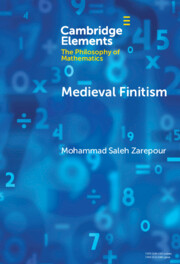Element contents
Medieval Finitism
Published online by Cambridge University Press: 09 January 2025
Summary
- Type
- Element
- Information
- Online ISBN: 9781009047623Publisher: Cambridge University PressPrint publication: 30 January 2025
References
Primary Sources
Secondary Sources
- 1
- Cited by

